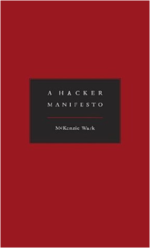McKenzie Wark, ‘copyright, copyleft, copygift’
 Sunday, July 24, 2011 at 1:25PM
Sunday, July 24, 2011 at 1:25PM Carrion’s primary concern of course was with the conception of the book as an object (a series of pages both divided and gathered together in a coherent, and usually numbered, sequence), and with its material forms of support and fabrication (paper, binding, printing, ink, typography, layout and so forth). Is it possible therefore that, rather than in ontological terms, the idea of the unbound book can be addressed more productively via one of the other senses in which books can be said to be tied? I am thinking specifically in terms of legal contracts. These function to establish territorial boundaries marking when certain ideas and actions relating to the book are ‘out of bounds’, forbidden, limited by restrictions and regulations (concerning copyright, Intellectual Property, notions of authorship, attribution and so on).
•
A 2007 article by McKenzie Wark, ‘Copyright, Copyleft, Copygift’, offers an interesting starting point for thinking about this aspect of the book. In it Wark addresses the contradiction involved in his having on the one hand written a book against the idea of intellectual property, A Hacker Manifesto, and on the other published it with an established academic press, Harvard, which refused to allow him to release it under a Creative Commons license as part of the new, emergent, digital gift economy.
Wark’s solution was to ‘Live the contradictions!’ between commodity and gift culture, and also to carry a memory stick to speaking events so anyone who wanted a post-print copy of A Hacker Manifesto could get one for free from him personally, in the form of a text file they could even alter if they so wished. Nevertheless, disseminating A Hacker Manifesto by sneakernet - or pink Roos, in Wark’s case - does little to resolve the problem he identifies: namely, how to meet an author’s desire to have their work distributed to, respected and read by as many people as possible -- something a ‘brand name’ print press like Harvard can deliver -- while also being part of the academic gift economy.
•
Surprisingly, Wark doesn’t appear to have been aware of the possibility of publishing his research open access, thus making it available online for free, to anyone with access to the internet, without the need on the part of readers to pay a cover price, library subscription charge or publisher’s fee. Yet even if he had been, open access would not have provided a straightforward solution to Wark’s dilemma, since there is an important difference between publishing scholarly journal articles open access and publishing books open access. As is made clear in the Self-Archiving FAQ written for the Budapest Open Access Initiative:
Where exclusive copyright has been assigned by the author to a journal publisher for a peer reviewed draft, copy-edited and accepted for publication by that journal, then that draft may not be self-archived [on the author’s own website, or in a central, subject or institutional repository] by the author (without the publisher's permission).
The pre-refereeing preprint, however, [may have] already been (legally) self-archived. (No copyright transfer agreement existed at that time, for that draft.)
This is how open access is able to elude many of the problems associated with copyright or licensing restrictions with regard to articles in peer reviewed journals (assuming the journals in question are not themselves already online and open access). But ‘where exclusive copyright… has been transferred... to a publisher’ -- for example, ‘where the author has been paid... in exchange for the text’, as is generally the case in book publishing, but not with journal articles -- it may be that the author is not legally allowed to self-archive a copy of their book or any future editions derived from it open access at all. This is because, although the ‘text is still the author's "intellectual property"… the exclusive right to sell or give away copies of it has been transferred to the publisher’.
(This is one of a series of posts written as version 3.0 of a contribution to Mark Amerika's remixthebook project. For other posts in the series, see below and here)
 Gary Hall | Comments Off |
Gary Hall | Comments Off | 






